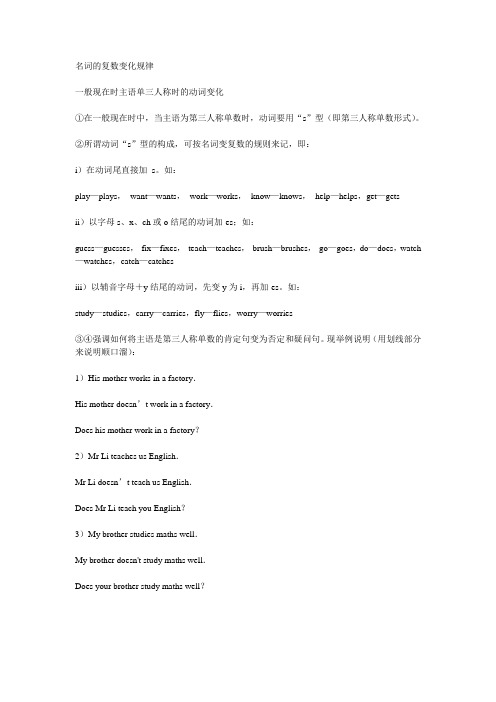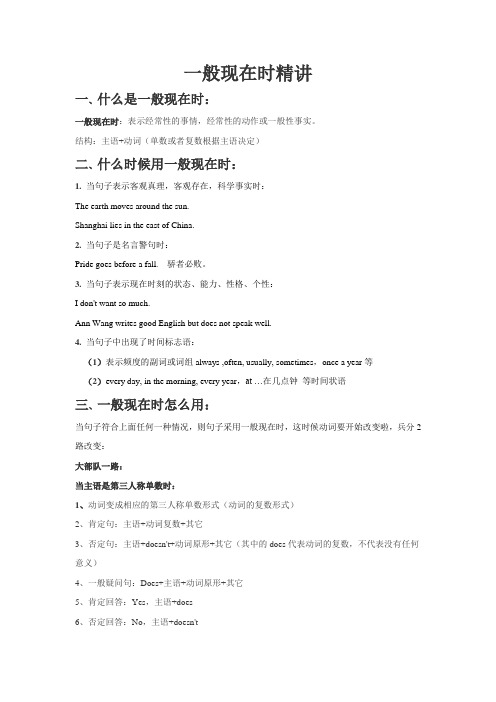一般现在时 动词三单
- 格式:doc
- 大小:22.00 KB
- 文档页数:2

名词的复数变化规律一般现在时主语单三人称时的动词变化①在一般现在时中,当主语为第三人称单数时,动词要用“s”型(即第三人称单数形式)。
②所谓动词“s”型的构成,可按名词变复数的规则来记,即:i)在动词尾直接加s。
如:play—plays,want—wants,work—works,know—knows,help—helps,get—getsii)以字母s、x、ch或o结尾的动词加-es;如:guess—guesses,fix—fixes,teach—teaches,brush—brushes,go—goes,do—does,watch —watches,catch—catchesiii)以辅音字母+y结尾的动词,先变y为i,再加-es。
如:study—studies,carry—carries,fly—flies,worry—worries③④强调如何将主语是第三人称单数的肯定句变为否定和疑问句。
现举例说明(用划线部分来说明顺口溜):1)His mother works in a factory.His mother doesn’t work in a factory.Does his mother work in a factory?2)Mr Li teaches us English.Mr Li doesn’t teach us English.Does Mr Li teach you English?3)My brother studies maths well.My brother doesn't study maths well.Does your brother study maths well?。

一般现在时三单动词的变化规则及练习题1.一般情况下,直接加-s2.以s. x. sh. ch. o结尾,加-es3.以“辅音字母+y”结尾,变y为i,再加-es一、写出下列动词的第三人称单数。
drink ________ go _______ stay ________ make ________ look _________ have_______pass_______ carry ____ come________ watch______ sing_______ fly ________ study_______brush________ do_________ teach_______二、用括号内动词的适当形式填空。
1. He often ________(have) dinner at home.2. Daniel and Tommy _______(be) in Class One.3. We _______(not watch) TV on Monday.4. XXX _______(not go) to the zoo on Sunday.5. What _______they often _______(do) on Sundays6. _______ your mother _______(read) newspapers every day7. XXX _______(like) cooking.8. I _______(be) XXX I’m in bed.9. Liu Tao _______(do) not like PE.10. The child often _______(watch) TV in the evening.11. Doyou ________(like)_________(run)12. Doeshe_________(like)_________(jump)13. Does Nancy_________(grow)flowers on Saturdayteachers________(like)___________(dance).15. The teacher________(like)____________(dance).16. The students___________(speak) English in class.17. The student_________(speak) Chinese after class.18. Let's___________and play football . ( go )19. He_____________ like swimming . ( not )20. I'm sorry ____________that . ( hear )3、依照请求改写句子1. XXX.(改为否定句)__________________________________________________ _2. I do XXX.(改成普通疑问句,作否认回覆)________________________________________________3. XXX.(改成普通疑问句,做一定回覆)__________________________________________________ _____4. XXX(改成普通疑问句,作否认回覆)___________________________________________________ _____5. We go to school on Sundays.(改成否认句)__________________________________________________ _____四.用所给的人称改写句子。

动词第三人称单数的变化规则在一般现在时的句子中,当主语是第三人称单数时,动词要发生变化。
一般现在时的肯定句中,主语为第三人称单数的动词变化主要体现在词尾的变化上,其规律大体有三点:1、一般情况下,直接在动词词尾+s。
2、以s, sh, ch, x, o结尾的动词,在词尾+es。
3、以辅音字母+y结尾的动词,变y为i,再+es。
4、动词have,遇到主语是第三人称单数时,要用has;动词be的第三人称单数形式是is。
5、含有动词第三人称单数形式的句子变否定句时,要用doesn't+动词原形.6、对含有动词第三人称单数形式的句子提问时,要用助动词does。
•动词第三人称单数的用法:在一般现在时中,当主语是第三人称单数时,谓语动词要用第三人称单数形式,即常在动词原形后加-s或-es。
现归纳总结如下:一、人称代词he, she, it是第三人称单数。
如:He likes watching TV. 他喜欢看电视。
She has lunch at twelve. 她十二点吃午餐。
It looks like a cat. 它看起来像只猫。
二、单个人名、地名或称呼作主语;是第三人称单数。
如:①HanMei looks like her mother. 韩梅看起来像她的母亲。
②Beijing is in China. 北京在中国。
③UncleWang often makes cakes. 王叔叔经常做蛋糕。
三、单数可数名词或"this/that/the+单数可数名词"作主语时,是第三人称单数。
如:①A horse is a useful animal.马是有用的动物。
②This book is yours.这本书是你的。
③That car is red.那辆小汽车是红色的。
④The cat is Lucy's.这只猫是露茜的。
四、不定代词someone, somebody, nobody, everything, something等及指示代词this, that 作主语时,是第三人称单数。

一般现在时三单动词的变化规则及练习题1.一般情况下,直接加-s 2.以s. x. sh. ch. o结尾,加-es 3.以“辅音字母+y”结尾,变y为i,再加-es一、写出下列动词的第三人称单数drink ________ go _______ stay ________ make ________ look _________ have_______ pass_______ carry ____ come________ watch______sing_______ fly ________ study_______ brush________ do_________ teach_______二、用括号内动词的适当形式填空。
1. He often ________(have) dinner at home.2. Daniel and Tommy_______(be) in Class One. 3. We _______(not watch) TV on Monday. 4. Nick _______(not go) to the zoo on Sunday.5. What _______they often _______(do) on Sundays?6. _______ your mother _______(read) newspapers every day?7. Mike _______(like) cooking. 8. I _______(be) ill. I’m in bed. 9. Liu Tao _______(do) not like PE. 10. The child often_______(watch) TV in the evening.三、按照要求改写句子1. He watches TV every evening.(改为否定句)___________________________________________________2. I do my homework every day.(改为一般疑问句,作否定回答) ________________________________________________3. She likes books.(改为一般疑问句,做肯定回答)_______________________________________________________4. Amy likes playing computer games.(改为一般疑问句,作否定回答)________________________________________________________5. We go to school on Sundays.(改为否定句)_______________________________________________________四、改错(划出错误的地方,将正确的写在横线上)1. Is your brother like English? __________________2. Does he likes swimming? __________________3. He likes play games. __________________4. Shedon’tdo her homework on Sundays. _________________五、把句子补充完整。

动词三单式变化规则
嘿,朋友们!咱今天来聊聊动词三单式变化规则呀!你知道一般现在时里,当主语是第三人称单数时,动词得有啥变化不?比如说,He likes music. 这里的 like 就加了 s 呢!哎呀,这就好像一个小魔术一样,动词就得乖乖变个样!
一般来说呀,大部分动词直接在后面加 s 就行啦!就像 Mary goes to school every day. 这里的 go 就变成了 goes 啦!
还有哦,如果动词是以 s、x、ch、sh 结尾的,那就要加 es 哦!举个例子呗,She watches TV in the evening. 你看,watch 就加上 es 啦!是不是很有意思呀?
要是动词是以辅音字母加 y 结尾的,那得把 y 变成 i 再加 es 呢!比如He studies hard. 这里的 study 就这么变啦!
咱可别小瞧了这动词三单式变化规则呀,这在英语里可重要啦!掌握了它,咱说英语才能更溜呀!大家可得好好记住哟!。

一般现在时精讲一、什么是一般现在时:一般现在时:表示经常性的事情,经常性的动作或一般性事实。
结构:主语+动词(单数或者复数根据主语决定)二、什么时候用一般现在时:1. 当句子表示客观真理,客观存在,科学事实时:The earth moves around the sun.Shanghai lies in the east of China.2. 当句子是名言警句时:Pride goes before a fall.骄者必败。
3. 当句子表示现在时刻的状态、能力、性格、个性:I don't want so much.Ann Wang writes good English but does not speak well.4. 当句子中出现了时间标志语:(1)表示频度的副词或词组always ,often, usually, sometimes,once a year等(2)every day, in the morning, every year,at …在几点钟等时间状语三、一般现在时怎么用:当句子符合上面任何一种情况,则句子采用一般现在时,这时候动词要开始改变啦,兵分2路改变:大部队一路:当主语是第三人称单数时:1、动词变成相应的第三人称单数形式(动词的复数形式)2、肯定句:主语+动词复数+其它3、否定句:主语+doesn't+动词原形+其它(其中的does代表动词的复数,不代表没有任何意义)4、一般疑问句:Does+主语+动词原形+其它5、肯定回答:Yes,主语+does6、否定回答:No,主语+doesn't7、特殊疑问句:特殊疑问词+一般疑问句(一般疑问句中用does)小分队一路:当主语不是第三人称单数时:1、动词不变成相应的第三人称单数形式(动词不用变成复数)2、肯定句:主语+动词原形+其它3、否定句:主语+don't+动词原形+其它(其中的do代表动词的单数,不代表没有任何意义)4、一般疑问句:Do+主语+动词原形+其它5、肯定回答:Yes,主语+do6、否定回答:No,主语+don't7、特殊疑问句:特殊疑问词+一般疑问句(一般疑问句中用do)总结起来就是这样的四、那么,动词如何变成复数呢:三单变化:(1)直接在动词词尾加-s.ask---asks work---works get---gets stay---stays(2)以字母s, x, ch, sh或o结尾的动词,在词尾直接加-es.watch---watches wish---wishes fix---fixes do---doesgo---goes pass---passes(3)以“辅音字母加- y”结尾的动词,要先变y为i再加-es.try---tries study---studies cry---cries fly---flies一、考点/易错点1动词变形有误1 He __ football very well.2 Danny __ to school at 7:10.答案:1 plays 2 goes plaies, gos解析:1以加y结尾的动词变单三人称形式才能把y换成i再加es;2与名词变复数不同,变单三人称形式以o结尾的词要加es.考点/易错点2对主语判断有误例:This book __mine答案: is解析: 书是属于“它(it)”的范围,是无生命的它,所以也是三单。
一般现在时1.概念:经常、反复发生的动作或行为及现在的某种状况。
2.时间状语:always,usually,often,sometimes,every week(day,year,month…),once a week, on Sundays,3.基本结构:动词原形/第三人称单数形式(如主语为第三人称单数,动词上要改为第三人称单数形式)4.否定形式:am/is/are+not; 谓语动词若为动词,则在其前加don't,如主语为第三人称单数,则用doesn't,同时还原行为动词。
5.一般疑问句:把be动词放于句首;用助动词do提问,如主语为第三人称单数,则用does,同时,还原行为动词。
三单动词的变化规则1.一般情况下,直接加-s如:play—plays, want—wants, work—works, know—knows, help —helps,get—gets2.以s. x. sh. ch. o结尾,加-es如:guess—guesses, fix—fixes, teach—teaches, brush—brushes, go —goes,do—does,watch—watches,catch—catches3.以“辅音字母+y”结尾,变y为i, 再加-es如:study—studies,carry—carries,fly—flies,worry—worries一般现在时用法专练:一、写出下列动词的第三人称单数drink ________ go _______ stay ________ make ________look _________ have_______ pass_______ carry ____come________ watch______ plant_______ fly ________study_______ brush________ do_________ teach_______catch _________ wash_________ like________have______say_________ learn ________ eat________ read_________ sing_______二、用括号内动词的适当形式填空。
一般现在时精讲一、什么是一般现在时:一般现在时:表示经常性的事情;经常性的动作或一般性事实..结构:主语+动词单数或者复数根据主语决定二、什么时候用一般现在时:1. 当句子表示客观真理;客观存在;科学事实时:The earth moves around the sun.Shanghai lies in the east of China.2. 当句子是名言警句时:Pride goes before a fall. 骄者必败..3. 当句子表示现在时刻的状态、能力、性格、个性:I don't want so much.Ann Wang writes good English but does not speak well.4. 当句子中出现了时间标志语:1表示频度的副词或词组always ;often; usually; sometimes;once a year等2every day; in the morning; every year;at …在几点钟等时间状语三、一般现在时怎么用:当句子符合上面任何一种情况;则句子采用一般现在时;这时候动词要开始改变啦;兵分2路改变:大部队一路:当主语是第三人称单数时:1、动词变成相应的第三人称单数形式动词的复数形式2、肯定句:主语+动词复数+其它3、否定句:主语+doesn't+动词原形+其它其中的does代表动词的复数;不代表没有任何意义4、一般疑问句:Does+主语+动词原形+其它5、肯定回答:Yes;主语+does6、否定回答:No;主语+doesn't7、特殊疑问句:特殊疑问词+一般疑问句一般疑问句中用does小分队一路:当主语不是第三人称单数时:1、动词不变成相应的第三人称单数形式动词不用变成复数2、肯定句:主语+动词原形+其它3、否定句:主语+don't+动词原形+其它其中的do代表动词的单数;不代表没有任何意义4、一般疑问句:Do+主语+动词原形+其它5、肯定回答:Yes;主语+do6、否定回答:No;主语+don't7、特殊疑问句:特殊疑问词+一般疑问句一般疑问句中用do总结起来就是这样的四、那么;动词如何变成复数呢:三单变化:1直接在动词词尾加-s.ask---asks work---works get---gets stay---stays2以字母s; x; ch; sh或o结尾的动词;在词尾直接加-es. watch---watches wish---wishes fix---fixes do---does go---goes pass---passes3以“辅音字母加 - y”结尾的动词;要先变y为i再加-es. try---tries study---studies cry---cries fly---flies一般现在时专项练习一、考点/易错点1动词变形有误1 He __ football very well.2 Danny __ to school at 7:10.答案:1 plays 2 goes plaies; gos解析:1以加y结尾的动词变单三人称形式才能把y换成i再加es;2与名词变复数不同;变单三人称形式以o结尾的词要加es.考点/易错点2对主语判断有误例: This book __mine答案: is解析: 书是属于“它it”的范围;是无生命的它;所以也是三单..二、例题精析We often___________play in the playground.A. playB. playsC. plaiesD.playedA主语是”we”;“often”是频率副词;句子用一般现在时三、实践运用基础1. The picture _______ nice.A. looksB. is lookedC. lookD. is looking答案:A解析:主语是第三人称单数;谓语动词用三单形式2. I ________TV once a week.A. watchesB. watchsC. watchD.watched答案:C解析:once a week一周一次;表示频率;动词用一般现在时..主语是第一人称;动词用原形..巩固1. John always ______ others.A. helpB. helpingC. helpsD. to help答案:C解析:主语是第三人称单数;谓语动词用三单形式2. The teacher told us that the sun ____in the east.A.risesB. roseC. raisesD.raised答案:A解析:太阳从东方升起;这是客观事实;用一般现在时;动词要用单三式拔高1. The students will go to the Summer Palace if it _____ tomorrow.A. don't rainB. doesn't rainC. won't rain答案:B..2. You should visit this part of the country when ___.A. spring will comB. spring comesC. It has been springD. It will be spring答案:B解析:when引导的时间;从句一般时态;主句用态或..所以选B专项练习:写出下列动词的相应形式:1. 第三人称单数: wash_________ match _______guess______study______ finish_________ go________ snow______ carry_________ 2.写出下列动词的过去式:stop______ see________ drive________let_______ carry______ keep_____ join______ find_______ think________ teach______ catch______3. 写出下列动词的现在分词形式: stay_______ begin______forget_______forget______ lie________ die _______ run_______ prefer______give________ring_______ dance______ hope_______II. 用所给动词的适当形式填空:√1.I ________write to you as soon as I _______get to London. √2. He doesn’t feel well and ____________not eat any food this morning.√3. He ______ not _______see me come in; for he ___________read something with great interest.√4. I _________let you have the book as soon as I _________finish it.√5. While we ________wait for our teacher; a little boy ________run up to us.6. Don’t make a noise. Grandpa __________sleep.7.It’s seven now;Tom’s family__________watch TV.√8. It ________take me two hours to finish my homework last night. √9. What ______ your mother _______do at eight yesterday evening She _______wash clothes.10. _______ it ______ rain when school was over yesterday11. What _______do _______ tomorrow We ________ play football.12. There ________ be a football match on TV this evening.13. They said they ________ visit the Great Wall the next summer holiday.√14. Who _______ dance the best in your class15. Will you come if he _____________ not come√16. The teacher told us the earth __________ move round the sun.17. They _______ have a party in the garden if it ________ not rain tomorrow.18 She ________ buy a sweater yesterday.19. I don’t know if Mr.Wang ______ go to Shanghai tomorrow. If he _____ go; I ______ ask him _______ take some books to my daughter; because she _______ study there.III单项选择:1.The students will go to the Summer Palace if it _____ tomorrow.A.don’t rainB. doesn’t rainC. won’t ra in2. There _____ an English film next week.A. will haveB. is going to haveC. is going to beD. was going to be3. The picture _______ nice.A. looksB. is lookedC. lookD. is looking4. She ______ down and soon fell asleep.A. liveB. lainC. laidD. lay5. They _____ the office at nine yesterday morning.A. reached toB. arrivedC. wentD. get to6. We shall go to Shanghai on business before you _____ back next week.A. wil comeB. cameC. would comeD. come7. Don’t smoke until the plane ______ off.A. takesB. tookC. was takenD. is take8. I saw her ____ the room this morning.A. to enterB. enteredC. enterD. enters9.the teacher asked us ______ to school on time.A. to comeB. comingC. comeD. comes10. John is always ______ others.A. helpB. helpingC. helpsD. to help11. He told us ______ at eight.A. workingB. to workC. workD. worked12. You’d better ______ at home and ______ your homework.A. to stay; doB. stay; doC. to stay; to doD. stay; to do13. He sat down ______ a rest.A. havingB. haveC. to haveD. had14. Uncle Wang knows _______ a washing machine.A. how to makeB. to makeC. how makingD. what to make15. Jim decided _______ Polly to Ling Feng when he was back toEngland.A. to leaveB. leftC. leavingD. leave。
三单使用条件三单使用条件是指英语中第三人称单数形式的动词使用的规则。
在英语中,动词的形式会根据主语的人称和数的不同而发生变化。
而在第三人称单数形式中,动词的变化规则有一些特殊之处。
本文将详细介绍三单使用条件的相关内容,帮助读者更好地理解和运用这一语法规则。
一、什么是三单使用条件在英语中,动词的三单使用条件表示的是当主语为第三人称单数时,动词需要进行相应的变化。
具体来说,三单使用条件包括以下几个方面:1. 在一般现在时中,动词的第三人称单数形式需要在动词原形的基础上加上-s或-es。
例如,动词work的第三人称单数形式为works。
2. 在一般过去时中,动词的第三人称单数形式与动词原形相同。
例如,动词run的第三人称单数形式仍然是run。
3. 在一般将来时中,动词的第三人称单数形式需要在动词原形的基础上加上will。
例如,动词play的第三人称单数形式为will play。
二、三单使用条件的例子为了更好地理解三单使用条件,下面将通过一些具体的例子来说明:1. 一般现在时:He plays basketball every day.(他每天都打篮球。
)2. 一般过去时:She went to the park yesterday.(她昨天去了公园。
)3. 一般将来时:The train will arrive at 9 o'clock.(火车将在9点到达。
)三、需要注意的细节在使用三单使用条件时,还需注意以下几点细节:1. 当主语为以-s、-sh、-ch、-x、-o结尾的名词时,动词的第三人称单数形式需要在动词原形的基础上加上-es。
例如,watch的第三人称单数形式为watches。
2. 当主语为以辅音字母+y结尾的名词时,动词的第三人称单数形式需要将y改为i,并加上-es。
例如,study的第三人称单数形式为studies。
3. 当主语为不可数名词时,动词的第三人称单数形式仍然和动词原形相同。
语法大全之一般现在时动词三单变化练习题 -答案
He often has dinner at home. 2.We do not watch TV on Mondays. 3.Nick does not go to the zoo on Sundays. 4.Do they like the World Cup? 5.What do they often do on Saturdays? 6.Do your parents read newspapers every day? 7.XXX. 8.She and I take a walk XXX. 9.There is some water in the bottle. 10.XXX XXX cooking. 11.They have the same hobby. 12.XXX. 13.You always do your homework well. 14.I am XXX. 15.XXX. 16.Liu Tao does not like PE. 17.The child often watches TV in the evening. 18.Su Hai and Su Yang have eight lessons this term. 19.XXX. 20.XXX his XXX. 21.I walk in the corridors.
文章: My Daily XXX I wake up at 6:30 in the morning。Then。I drink a cup of coffee and eat breakfast。After that。I take a shower and get dressed。I leave for work at around 8:00.I usually arrive at the office at 9:00.
一般现在时的句子结构
1、当句子表状态说明主语是什么或怎么样时
句子结构为:主+BE动词(am, is, are)+其他.
否定式为:主+BE动词+not+其他.
疑问句为:BE+主+其他?
例: The twin sisters are from America.
The twin sisters are not from America.
Are the twins from America?
2、当谓语由实义动词充当,主语不是第三人称单数时,
句子结构为:主语+动词原形+其它.
否定式为:主语+don't+动词原形+其它.
疑问句为:Do+主语+动词原形+其它?
例: We speak Chinese.
They don't speak Chinese.
Do you speak Chinese?
3、当主语是第三人称单数时:
句子结构为 主语+动词(词尾加s或es)+其它.
否定式为:主语+doesn't+动词原形+其它.
疑问句式:Does+主语+动词原形+其它。
动词三单变化方法
1. 一般情况下在动词后面加 s。例如 read---reads,
write---writes, like---likes, take---takes, see---sees,
say---says, help---helps 等等。
2. 遇到以 -ch, -sh, -s, -x, -o 结尾的动词,加 es。例如
teaches, washes, guesses, fixes, goes, does 等。
3. 遇到以“辅音字母+y” 结尾的动词,将 y 改为 i 后加 es。
例如 try---tries, study---studies, carry---carries 等。
4. 个别动词有特殊的变化形式:have---has, be---is。